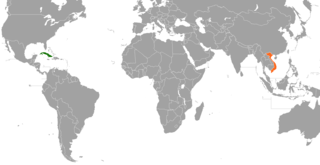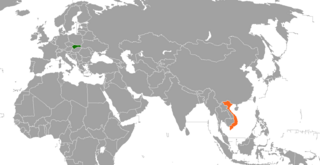
Hồ Chí Minh, colloquially known as Uncle Ho and by other aliases and sobriquets, was a Vietnamese revolutionary and politician who served as the founder and first president of the Democratic Republic of Vietnam from 1945 until his death in 1969, and as its first prime minister from 1945 to 1955. Ideologically a Marxist–Leninist, he founded the Indochinese Communist Party in 1930 and its successor Workers' Party of Vietnam in 1951, serving as the party's chairman until his death.

Paul Mus (1902–1969) was a French writer and scholar. His studies focused on Vietnam and other Southeast Asian cultures.

Vietnam Railways is the state-owned operator of the railway system in Vietnam. The principal route is the 1,727 km (1,100 mi) single-track North–South Railway line, running between Hanoi and Ho Chi Minh City. This was built at the metre gauge in the 1880s during the French colonial rule. There are also standard gauge lines running from Hanoi to the People’s Republic of China, eventually leading to Beijing, and some mixed gauge in and around Hanoi.

Russia–Vietnam relations date back formally to 30 January 1950, when the Union of Soviet Socialist Republics established an embassy to North Vietnam. The Soviet Union was one of the first countries in the world to recognize and formally establish diplomatic relations with Vietnam, laying the foundations for strong and cooperative friendship between the two countries.

Formal relations between the United States and Vietnam were initiated in the nineteenth century under former American president Andrew Jackson, but relations soured after the United States refused to protect the Kingdom of Vietnam from a French invasion.
Indians in Vietnam consist of migrants to Vietnam from India, both historical and recent. As of 2011, there were about 2,000 people of Indian origin settled in Vietnam, mainly in Ho Chi Minh City. Prior to the Vietnam War, there was a vibrant Indian community consisting of primarily Tamils, and specifically the Chettiars.

India–Vietnam relations, also known as Indian-Vietnamese relations, are the bilateral relations of India and Vietnam.

Malaysia–Vietnam relations date to at least the 15th century. Malaysia forged diplomatic ties with the modern-day Vietnamese state on 30 March 1973; as of 2015, these ties are still in existence. During the late 1970s and 1980s, the countries' relationship became strained as a result of the Cambodian–Vietnamese War and the influx of Vietnamese boat people into Malaysia. The subsequent resolution of these issues saw the cultivation of strong trade and economic ties, and bilateral trade between the countries grew strongly, with an expansion into areas including information technology, education and defence. Both countries are members of APEC and ASEAN.

Mongolia–Vietnam relations are bilateral relations between Mongolia and Vietnam. Vietnam has an embassy in Ulaanbaatar. Mongolia has an embassy in Hanoi.
Lawrence Ting Shan-li was a Taiwanese decorated soldier and businessman who became one of the largest foreign investors in Vietnam. As founder of Phu My Hung Corporation and Saigon South Urban Development Project, Ting was instrumental in the southward expansion of Ho Chi Minh City. Today, the neighborhood created by Ting has become “a new sustainable, inclusive, knowledge-based urban center.”

After World War II and the collapse of Vietnam's monarchy, France attempted to re-establish its colonial rule but was ultimately defeated in the First Indo-China War. The Geneva Accords in 1954 partitioned the country temporarily in two with a promise of democratic elections in 1956 to reunite the country. The United States and South Vietnam insisted on United Nations supervision of any election to prevent fraud, which the Soviet Union and North Vietnam refused. North and South Vietnam therefore remained divided until the Vietnam War ended with the Fall of Saigon in 1975.

Cuban–Vietnam relations are the interstate and special relations between the Republic of Cuba and the Socialist Republic of Vietnam. The relations are based on trade, credits, and investments which have increased significantly since the 1990s and on shared ideological beliefs – they are both socialist states. Diplomatic relations between the post-revolutionary Cuba and the Democratic Republic of Vietnam were established on December 12, 1960. Since then, Vietnam has become Cuba's second-largest trading partner in Asia, with Vietnam trailing behind China.

Archimedes Leonidas Attilio Patti was a lieutenant colonel in the United States Army and an Office of Strategic Services officer who headed operations in Kunming and Hanoi in 1945 when he was a Major. Patti is known for having worked closely with Hồ Chí Minh and the Việt Minh, this before and after Ho became President of the Provisional Government of the Democratic Republic of Vietnam in 1945.

Indonesia and Vietnam established diplomatic relations in 1955. Indonesia has an embassy in Hanoi and a consulate general in Ho Chi Minh City while Vietnam has an embassy in Jakarta. Both are neighboring nations that have a maritime border which lies on the South China Sea and are members of ASEAN and APEC.

The nations of Mexico and Vietnam established diplomatic relations in 1975. Both nations are members of the Asia-Pacific Economic Cooperation, Forum of East Asia-Latin America Cooperation and the United Nations.

Canada and Vietnam have maintained bilateral relations since 1973. Both nations are members of the Asia-Pacific Economic Cooperation, Organisation internationale de la Francophonie and the United Nations.

Slovakia–Vietnam relations refers to the bilateral relations between Slovakia and Vietnam. Slovakia has an embassy in Hanoi with a consulate in Ho Chi Minh City; and Vietnam has an embassy in Bratislava.















